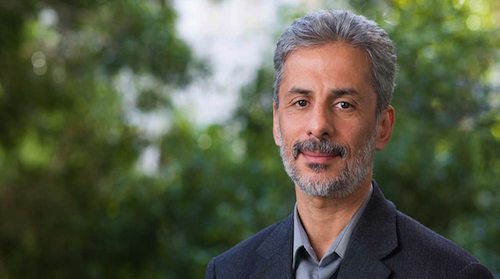[Author]By: Christina Johnson
UC Newsroom[/Author]
Thousands of well-educated foreign-trained physicians in California face daunting barriers to becoming doctors here, and UC San Diego School of Medicine physicians are trying to help – out of altruism and to improve patient care in San Diego County.
A group of doctors in the UC San Diego Department of Family and Preventive Medicine recently hosted a forum for approximately 50 local foreign-trained doctors, during which they explained and fielded questions about the U.S. primary health care system and its residency acceptance criteria.
It’s hoped the event, “An Evening with UCSD Family Medicine Doctors,” will plant the seed for greater UC San Diego involvement in re-training international medical school graduates, and that sustained involvement in such an effort will eventually help supply the county’s growing immigrant and refugee communities with much-needed multi-lingual, “culturally competent” family doctors.
“We hear these heartbreaking stories of people who were heads of departments and are now almost ashamed in front of their families about being unemployed,” said Dr. Wael Al-Delaimy, professor and chief of the Division of Global Health in the Department of Family and Preventive Medicine and the forum’s moderator. “These people’s stories are so compelling, but we also need and are in short supply of people with their training and cultural reference points.”
Studies show that patients fare better when they are treated by physicians who speak their language and have shared cultural backgrounds.
“We know that cultural competency is a huge piece of the racial and ethnic divide in health care outcomes,” said Gail Patterson, a project manager at Welcome Back Center, a non-profit at Grossmont-Cuyamaca Community College District that offers educational programs to internationally trained health care professionals and co-sponsored the forum.
There is also evidence, she said, that foreign-trained doctors who become licensed in California are more likely to become primary care physicians in underserved communities.
This has particular relevance for patient care in San Diego County, which has become a major hub for refugee resettlement.
More refugees arrived in San Diego County than any other county in the state between October 2008 and September 2013 – an estimated 15,308 refugees, compared with 9,611 refugees in Los Angeles County, the second highest county. In comparison, over the same five-year period, just four refugees resettled in Santa Cruz County, seven in San Luis Obispo County and 11 in Santa Barbara County.
San Diego’s refugee community is populous and also educated, in large part because of the high proportion of Iraqi refugees, who fled the country’s sectarian violence and were disproportionally part of the country’s cultural elite. By one estimate (PDF), 63 percent of all recent Iraqi refugees in America are college-educated. About 30 percent of Americans older than 25 hold bachelor’s degrees, according to the U.S. Census Bureau.
“After World War II, the term was ‘brain drain,’ but there is a new phrase, ‘brain waste,’” Patterson said. “I know a neurosurgeon who is driving a cab. The stories go on and on.”
The path to becoming medically licensed in the U.S. is long and difficult for a reason – to protect and maintain the quality of the nation’s health care. Some doctors and immigrant advocates, however, say the standards are duplicative, outdated and unduly expensive.
Fahima Nadi, a refugee from Afghanistan who completed seven years of medical school and a year of residency training in Kabul before fleeing the country in 2009, can attest to the cost of re-establishing herself professionally. She says she has spent about $1,200 to have her diplomas and transcripts verified and to take the first of three exams required to obtain medical licensure in the U.S.
Her biggest fear, though, is failing to get matched into a medical residency program. “I will become a doctor and help people no matter where they are from,” said Nadi, who attended the doctors’ forum. “The only concern is I hear people saying that they give priority to U.S. medical graduates.”
All doctors, no matter what their status abroad, unless they are from Canada, must complete a 3-plus-year residency program at an American academic health system. During this residency period, doctors are trained in their medical specialty, before going on to take medical licensing boards.
Nadi’s concerns about being placed into a residency program are grounded in statistical reality, as foreign medical graduates are about half as likely to land a residency as those from U.S. medical schools. This year, for example, 49.5 percent of foreign-trained immigrant doctors were matched in a U.S. residency program, compared with 94.4 percent of U.S. medical school seniors.
Al-Delaimy, an Iraqi native who came to the U.S. from New Zealand to accept a post-doctoral position at Harvard, said that “our plan is to develop a structured academic-community partnership to retrain highly selected candidates and offer them curricular material about the U.S. health system, patient-doctor relationship, case studies and simulated patients, as well as financial support to sit for the qualifying exams.”
One of the main benefits of a structured program would be that the foreign doctors would be able to formally network with UC San Diego doctors and obtain letters of recommendation for medical residency training. “This would be a huge step forward for foreign doctors,” he said.
He and colleagues believe that society cannot afford to let the refugees’ medical training go to waste, especially in light of the growing shortage of family doctors in some underserved communities.
“A newly graduating medical student costs around $250,000 to educate, while retraining a skilled international graduate might not cost more than $25,000,” Al-Delaimy said. “We are looking at a win-win situation if they get licensed.”



